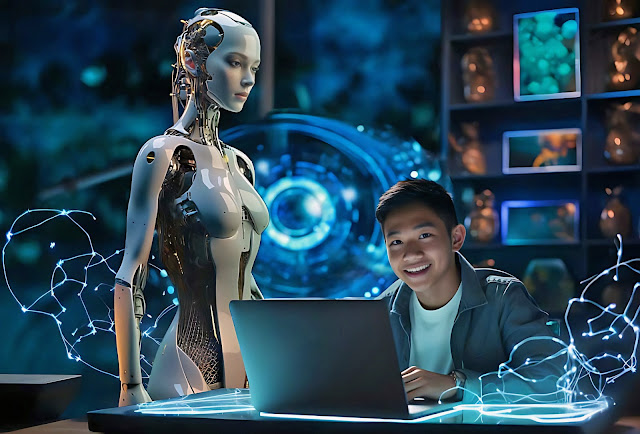Beyond the Textbook: How AI is Revolutionizing the Future of Learning
By: Javid Amin
The digital age is upon us, and Artificial Intelligence (AI) is poised to become the transformative force shaping the world of tomorrow. In India, a nation brimming with young talent, preparing students for this AI-powered future is no longer an option, but a necessity. This necessitates fostering a generation of educators equipped to impart AI knowledge and ignite a passion for innovation in the minds of young learners.
Bridging the Gap: The Rise of AI Education in India
The traditional education landscape is undergoing a metamorphosis. Universities and online platforms are at the forefront, meticulously crafting AI-centric curriculums. These comprehensive programs encompass a diverse range of fields, including:
- Machine Learning: Unveiling the secrets of algorithms that “learn” from data, enabling them to make predictions and solve complex problems.
- Robotics: Delving into the fascinating world of intelligent machines, exploring their design, operation, and potential applications.
- AI Ethics: Equipping students with the critical thinking skills necessary to navigate the ethical considerations surrounding AI development and deployment.
These courses cater to a wide range of learners, from absolute beginners to those seeking advanced knowledge. Additionally, the New Education Policy 2020 recognizes the immense potential of AI and advocates integrating it into the curriculum at all levels. This policy shift, coupled with initiatives like the IndiaAI Futureskills program, signifies the government’s commitment to democratize AI education and empower students across the nation.
The Symphony of AI Education: A Diverse Orchestra of Career Opportunities
The burgeoning field of AI education presents a plethora of exciting career paths. Let’s delve deeper into some prominent roles:
-
AI Curriculum Developers: These trailblazers act as architects, meticulously crafting AI programs and courses. They meticulously analyze the specific needs of the Indian context, ensuring the curriculum is culturally relevant and caters to the unique challenges and opportunities the nation faces.
-
Regional Language AI Trainers: India boasts a rich tapestry of languages. To bridge the digital divide and ensure inclusivity, the nation needs a dedicated pool of trainers who can effectively communicate complex AI concepts in regional languages. This fosters a deeper understanding amongst students and empowers them to actively participate in the AI revolution.
-
Policy and Regulatory Experts: As AI tools become ubiquitous, the need for robust policies and regulations becomes paramount. These experts play a pivotal role in shaping the roadmap for responsible AI development and implementation. Their foresight and expertise ensure that AI technologies are harnessed for the betterment of society, addressing ethical concerns and safeguarding potential risks.
-
AI Educators: These passionate individuals form the backbone of AI education. They can be affiliated with traditional educational institutions or online platforms, imparting AI knowledge and igniting a spark of curiosity in students of all ages. A noteworthy subset within this category is the rural AI educator. These educators possess a deep understanding of the specific challenges faced by rural education systems and tailor their teaching methodologies accordingly, ensuring that the benefits of AI education reach every corner of the nation.
Unveiling the Pathway to Success: Skills and Resources for Aspiring AI Educators
A career in AI education demands a unique blend of technical knowledge, pedagogical expertise, and an unwavering passion for nurturing young minds. Here’s a roadmap to equip yourself for this rewarding journey:
-
Technical Proficiency: A strong foundation in AI fundamentals is crucial. Consider enrolling in online courses offered by platforms like NPTEL or NIELIT, or pursuing a degree in Computer Science or related fields with a specialization in AI.
-
Communication Skills: The ability to explain complex concepts in a clear, concise, and engaging manner is essential. Hone your communication skills through workshops or online resources. Consider incorporating interactive learning activities and real-world examples to make AI concepts more relatable for students.
-
Passion for Learning: The AI landscape is constantly evolving. Develop a passion for continuous learning to stay abreast of the latest advancements and ensure your teaching methods remain relevant and cutting-edge.
-
Empathy and Patience: Teaching is all about understanding the needs of your students. Cultivate empathy and patience to guide them through challenges and celebrate their successes.
Building a Tech-Savvy India: The Ripple Effect of AI Education
India’s ambitious goal of becoming an AI superpower hinges on fostering a robust AI ecosystem and nurturing a skilled workforce. By empowering educators with the necessary tools and resources, we empower students to become the architects of the future.
A career in AI education offers more than just a job; it’s an opportunity to shape young minds and play a pivotal role in India’s journey towards becoming a global leader in the AI domain. As AI continues to evolve, so too will the landscape of AI education. The future presents a multitude of possibilities, from the development of personalized learning platforms powered by AI to the integration of virtual reality and augmented reality tools to enhance the learning experience and foster deeper engagement.
The Future Symphony: Envisioning the Evolution of AI Education
The journey of AI education is akin to a symphony, constantly in flux and evolving with each technological advancement. Just as AI itself undergoes continuous refinement, so too will the methods and tools employed to educate future generations. Let’s explore some potential avenues for the future of AI education in India:
-
Personalized Learning Paths: AI-powered platforms hold immense potential to personalize the learning experience. These platforms can analyze a student’s strengths, weaknesses, and learning style, tailoring the curriculum and pace of instruction accordingly. This ensures a deeper understanding and maximizes the learning potential of each student.
-
Immersive Learning Experiences: Virtual Reality (VR) and Augmented Reality (AR) technologies can revolutionize the way we learn. Imagine students virtually exploring the inner workings of a robot or experiencing historical events firsthand through VR simulations. These immersive experiences can foster a deeper understanding of AI concepts and spark a lifelong fascination with technology.
-
Gamification: The inherent appeal of games can be harnessed to make learning fun and engaging. Educational games that incorporate AI concepts and challenges can encourage students to actively participate and reinforce their understanding in a stimulating and enjoyable way.
-
Collaborative Learning Platforms: AI-powered platforms can facilitate collaborative learning environments where students across geographical boundaries can connect and work together on projects. This fosters teamwork, problem-solving skills, and cross-cultural communication, preparing them for the interconnected world of tomorrow.
Breaking Down Barriers: Championing Accessibility and Inclusivity
For AI education to truly flourish, it must be accessible and inclusive. Here are some key considerations:
-
Bridging the Digital Divide: Unequal access to technology and infrastructure poses a significant challenge. Initiatives focused on expanding internet access and providing low-cost devices are crucial to bridge the digital divide and ensure all students have the opportunity to participate in the AI revolution.
-
Multilingual Learning Resources: Developing AI learning materials in various Indian languages is essential to cater to the diverse linguistic landscape of the nation. This empowers students from all regions and backgrounds to engage with AI concepts in their native languages.
-
Focus on Special Needs Education: AI-powered tools can be utilized to personalize learning experiences for students with special needs. These tools can cater to diverse learning styles and provide additional support to ensure no student is left behind.
The Call to Action: Empowering Educators and Students for the AI-Driven Future
The future of AI education is brimming with possibilities. However, transforming this potential into reality requires a collaborative effort. Here’s what we can do:
-
Supporting Educators: Providing ongoing professional development opportunities for AI educators is crucial. These programs can equip them with the latest teaching methodologies, tools, and resources to remain at the forefront of the AI education landscape.
-
Engaging with Parents and Communities: Raising awareness about the importance of AI education is essential. By collaborating with parents and community leaders, we can encourage them to actively participate in their children’s AI learning journeys. This collaborative approach fosters a supportive environment that nurtures a passion for technology in young minds.
-
Encouraging Innovation: The Indian education sector needs to embrace innovation and experimentation. Supporting the development of new AI-powered learning tools and fostering collaboration between educators, researchers, and tech companies can lead to groundbreaking advancements that redefine the future of AI education.
By embracing these opportunities and challenges, India can cultivate a thriving ecosystem for AI education. This, in turn, will empower young minds to become the architects of the future, harnessing the power of AI to solve complex problems and build a brighter tomorrow for all.






